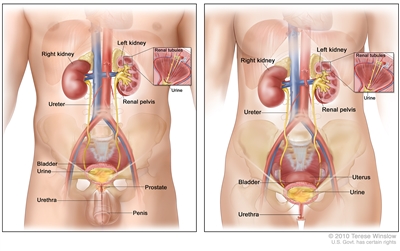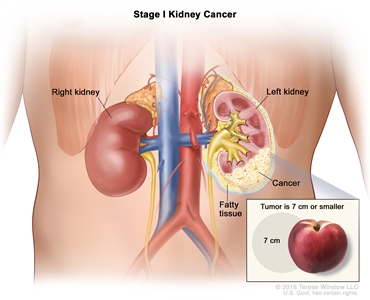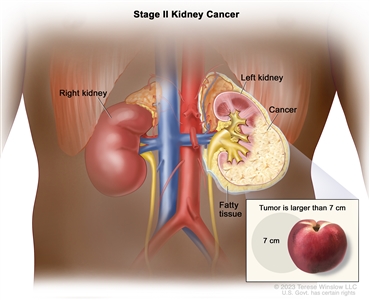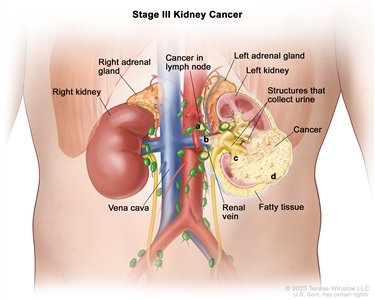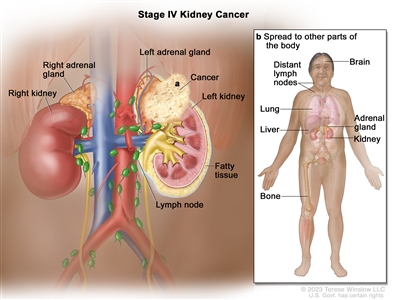Treatment Option Overview for Renal Cell Cancer
There are different types of treatment for people with renal cell cancer.
Different types of treatments are available for people with renal cell cancer. You and your cancer care team will work together to decide your treatment plan, which may include more than one type of treatment. Many factors will be considered, such as the stage of the cancer, your overall health, and your preferences. Your plan will include information about your cancer, the goals of treatment, your treatment options and the possible side effects, and the expected length of treatment.
Talking with your cancer care team before treatment begins about what to expect will be helpful. You'll want to learn what you need to do before treatment begins, how you'll feel while going through it, and what kind of help you will need. To learn more, see Questions to Ask Your Doctor About Treatment.
The following types of treatment are used:
Surgery
Surgery to remove part or all of the kidney is often used to treat renal cell cancer. The following types of surgery may be used:
- Partial nephrectomy is surgery to remove the cancer within the kidney and some of the tissue around it. A partial nephrectomy may be done to prevent loss of kidney function when the other kidney is damaged or has already been removed.
- Simple nephrectomy is surgery to remove the kidney only.
- Radical nephrectomy is surgery to remove the kidney, the adrenal gland, surrounding tissue, and usually nearby lymph nodes.
A person can live with part of one working kidney, but if both kidneys are removed or not working, the person will need dialysis (a procedure to clean the blood using a machine outside of the body) or a kidney transplant (replacement with a healthy donated kidney). A kidney transplant may be done when the disease is in the kidney only and a donated kidney can be found. If the person has to wait for a donated kidney, other treatment is given as needed.
After the doctor removes all the cancer that can be seen at the time of the surgery, some people may receive radiation therapy to kill any cancer cells that are left. Treatment given after surgery to lower the risk that the cancer will come back is called adjuvant therapy.
When surgery to remove the cancer is not possible, other procedures might be done:
- Arterial embolization may be used to shrink the tumor. A small incision (cut) is made, and a catheter (thin tube) is inserted into the main blood vessel that flows to the kidney. Small pieces of a special gelatin sponge are injected through the catheter into the blood vessel. The sponges block the blood flow to the kidney and prevent the cancer cells from getting oxygen and other substances they need to grow.
- Cryosurgery uses an instrument to freeze and destroy abnormal tissue. This type of treatment is also called cryotherapy. Learn more about Cryosurgery to Treat Cancer.
- Thermal ablation (also called hyperthermia) uses heat to destroy abnormal tissue. Learn more about Hyperthermia to Treat Cancer.
Radiation therapy
Radiation therapy uses high-energy x-rays or other types of radiation to kill cancer cells or keep them from growing. External beam radiation therapy uses a machine outside the body to send radiation toward the area of the body with cancer. External beam radiation therapy is used to treat renal cell cancer, and may also be used as palliative therapy to relieve symptoms and improve quality of life. A specific way to give radiation therapy called stereotactic ablative body radiation therapy, or stereotactic radiosurgery, may be used in some cases.
Learn more about External Beam Radiation Therapy for Cancer and Radiation Therapy Side Effects.
Immunotherapy
Immunotherapy helps a person's immune system fight cancer. Your doctor may suggest biomarker tests to help predict your response to certain immunotherapy drugs. Learn more about Biomarker Testing for Cancer Treatment.
Immunotherapy drugs used to treat renal cell cancer include:
- avelumab
- interferon
- interleukin-2
- ipilimumab
- nivolumab
- pembrolizumab
Learn more about Immunotherapy to Treat Cancer.
Targeted therapy
Targeted therapy uses drugs or other substances to identify and attack specific cancer cells. Your doctor may suggest biomarker tests to help predict your response to certain targeted therapy drugs. Learn more about Biomarker Testing for Cancer Treatment.
Targeted therapies used to treat renal cell cancer include:
- axitinib
- bevacizumab
- cabozantinib
- everolimus
- lenvatinib
- pazopanib
- sorafenib
- sunitinib
- temsirolimus
- tivozanib
Learn more about Targeted Therapy to Treat Cancer.
New types of treatment are being tested in clinical trials.
For some people, joining a clinical trial may be an option. There are different types of clinical trials for people with cancer. For example, a treatment trial tests new treatments or new ways of using current treatments. Supportive care and palliative care trials look at ways to improve quality of life, especially for those who have side effects from cancer and its treatment.
You can use the clinical trial search to find NCI-supported cancer clinical trials accepting participants. The search allows you to filter trials based on the type of cancer, your age, and where the trials are being done. Clinical trials supported by other organizations can be found on the ClinicalTrials.gov website.
Learn more about clinical trials, including how to find and join one, at Clinical Trials Information for Patients and Caregivers.
Treatment for renal cell cancer may cause side effects.
For information about side effects caused by treatment for cancer, visit our Side Effects page.
Follow-up care may be needed.
As you go through treatment, you will have follow-up tests or check-ups. Some tests that were done to diagnose or stage the cancer may be repeated to see how well the treatment is working. Decisions about whether to continue, change, or stop treatment may be based on the results of these tests.
Some of the tests will continue to be done from time to time after treatment has ended. The results of these tests can show if your condition has changed or if the cancer has recurred (come back).
After treatment for renal cell cancer, a blood test to measure amounts of carcinoembryonic antigen (a substance in the blood that may be increased when cancer is present) may be done to see if the cancer has come back.
